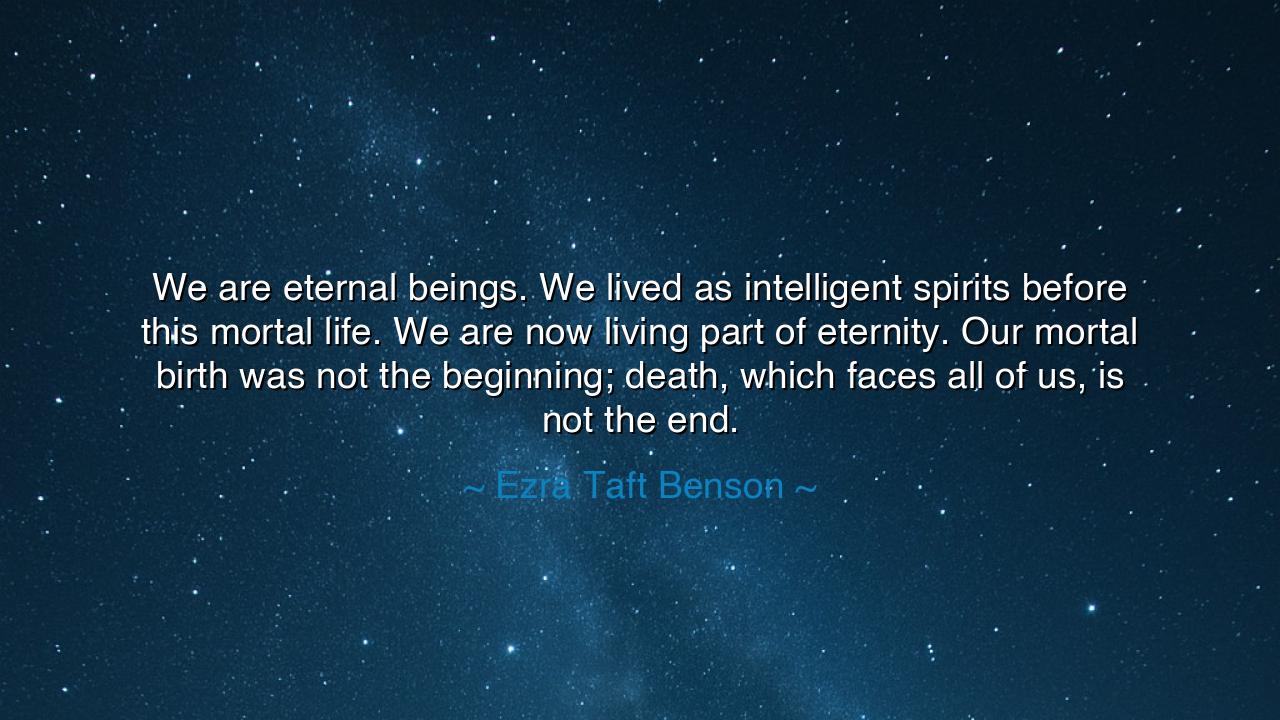
We are eternal beings. We lived as intelligent spirits before
We are eternal beings. We lived as intelligent spirits before this mortal life. We are now living part of eternity. Our mortal birth was not the beginning; death, which faces all of us, is not the end.






The prophet and statesman Ezra Taft Benson, who once led both a nation’s conscience and a faith’s people, declared a truth as old as the stars: “We are eternal beings. We lived as intelligent spirits before this mortal life. We are now living part of eternity. Our mortal birth was not the beginning; death, which faces all of us, is not the end.” In these words, he gives voice to the ancient and sacred conviction that life is not a brief spark in the void, but a continuum of eternity—that before we drew breath, we already were, and after the heart’s final beat, we shall still be. His words remind humanity that it is not dust that gives rise to consciousness, but spirit, and that death itself is but a door, not a wall.
The origin of this quote lies in Benson’s lifelong devotion to the doctrines of the restored gospel of Jesus Christ. As a leader in The Church of Jesus Christ of Latter-day Saints and later as its thirteenth president, he taught that the human spirit existed before birth, in a premortal realm of divine purpose, and that our journey on Earth is a chapter—brief, but sacred—in an everlasting story. In this teaching, Benson echoes the great cosmic vision that pervades scripture and prophecy: that man is not merely an animal bound to decay, but a child of God, carrying within himself the spark of the divine. To live with this knowledge, he taught, is to rise above fear, to see life not as fleeting but as infinite in meaning.
When he says, “We are now living part of eternity,” he unveils a truth that humbles the wise and consoles the broken. We are not waiting for eternity—it is already here. Every moment of love, every act of goodness, every breath of faith is woven into the fabric of eternal existence. The present life, with all its struggles and triumphs, is not preparation for eternity—it is eternity unfolding. Our mortal experience is but one expression of the everlasting soul, and what we do here—how we think, act, forgive, and believe—echoes beyond the grave. This awareness transforms how we see both living and dying: for if we are eternal, then no pain is wasted, no loss is final, and no goodbye is forever.
This teaching finds echoes in many traditions. The philosopher Plato spoke of the soul as immortal, recalling truths it knew before birth. The mystics of the East have long declared that death is but a transformation, not an annihilation. And in the Christian revelation, Christ himself shattered death’s illusion, rising from the tomb to proclaim life everlasting. Yet Benson’s voice adds a distinctly personal warmth: he speaks not to scholars but to souls, assuring each listener that their life matters in the vast expanse of divine time. To him, eternity is not distant or abstract—it is intimate, present, and already within us.
Consider the story of Florence Nightingale, who during the Crimean War walked through the shadow of death daily, tending to the broken and dying. Surrounded by suffering, she found purpose not in despair but in faith—the conviction that the soul endures beyond the body, that each act of mercy ripples through eternity. Her courage was not born of denial, but of vision: she saw beyond the mortal wound to the immortal worth of every soul. Like Benson, she lived as one who knew that death was not the end, and it was this certainty that gave her strength to bring light into the darkness.
Benson’s words also serve as a warning against the emptiness of materialism. The world, in its blindness, teaches that life begins at birth and ends at death, that man is a creature of instinct and decay. But to believe thus is to live in chains—to see beauty as accidental, love as temporary, and morality as illusion. The one who forgets his eternal nature becomes a wanderer without purpose. Yet the one who remembers that he is spirit clothed in flesh becomes free. He lives with patience amid hardship, with hope amid loss, with reverence amid abundance. For he knows that all that is mortal is but a reflection of the eternal, and all that is eternal is within his reach.
Lesson and Practice:
Live each day as one who walks through eternity. Let this awareness shape your choices, soften your heart, and deepen your gratitude. When grief comes, remember that death is but a passage to reunion. When pride tempts you, remember that the body is dust, but the soul divine. When you love, love with eternity in your eyes—for such love never dies. Seek to align your will with the divine, knowing that every act of kindness is carved into the fabric of forever. For as Ezra Taft Benson teaches, you are not a fleeting breath in the cosmic wind; you are an eternal being, radiant, enduring, and beloved, living not at the edge of eternity—but within it.






AAdministratorAdministrator
Welcome, honored guests. Please leave a comment, we will respond soon